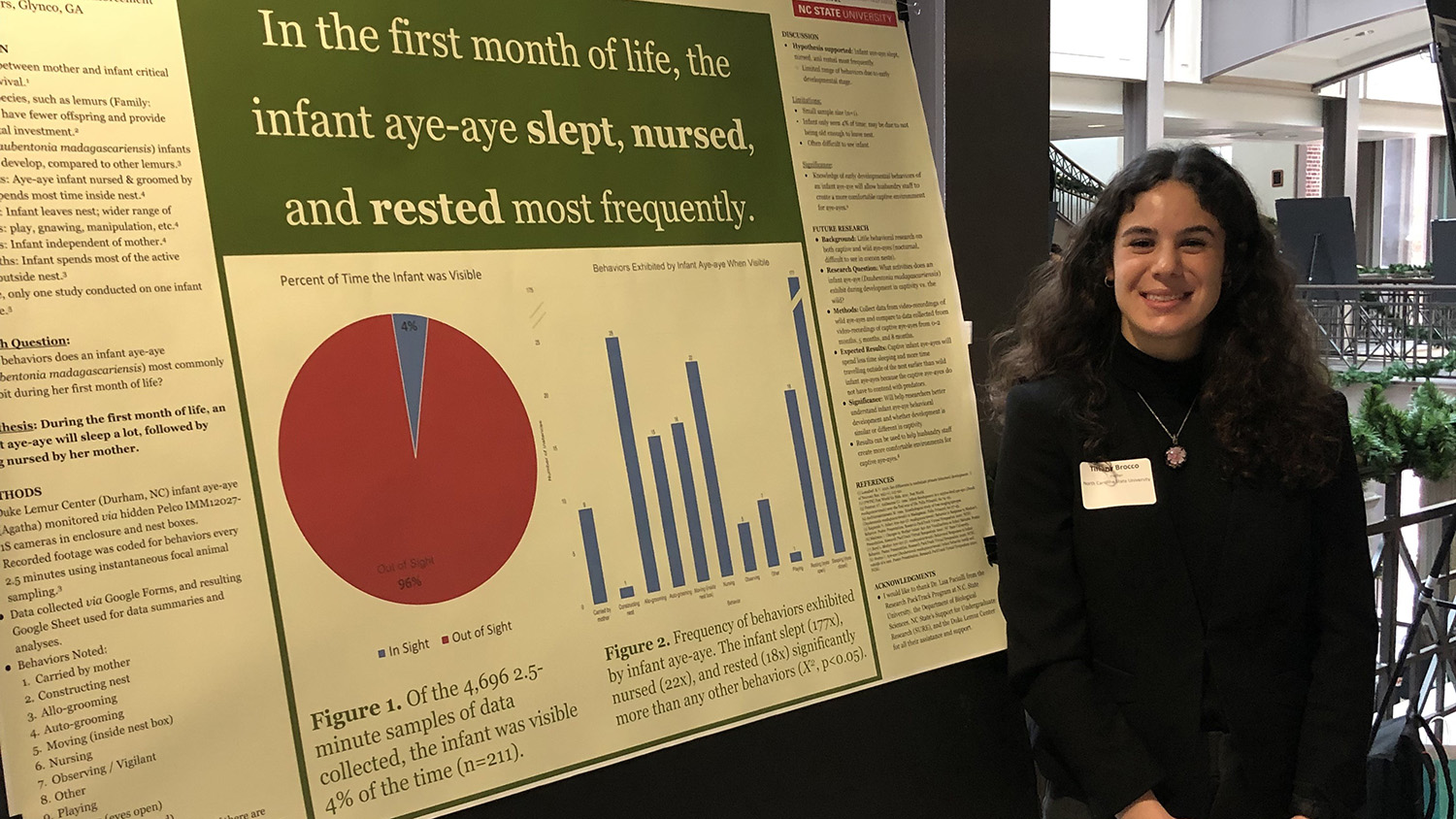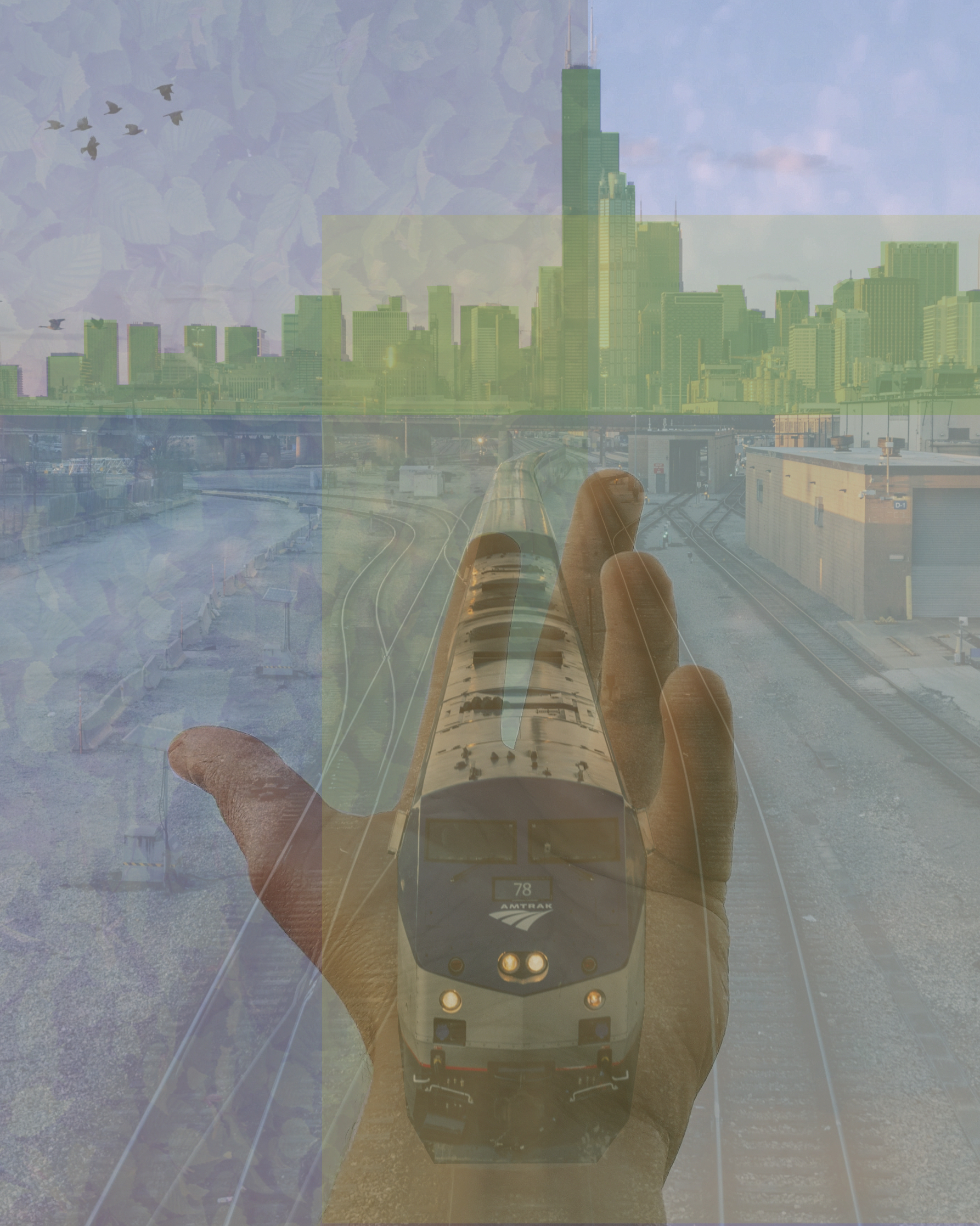PEP Makes an Impact

NC State’s Provost’s Professional Experience (PEP) Program provides students meaningful on-campus employment opportunities for career development. Students may participate in undergraduate research opportunities that help shape their academic and future professional pursuits, and often involve crossing disciplinary boundaries for a high-impact experience. We spoke with several PEP participants about their involvement in the program, their experiences in interdisciplinary scholarship, and how this shapes their future trajectory.
Two of these students worked in the lab of Lisa Paciulli, a senior lecturer in the Department of Biological Sciences, who directs a lab dedicated to studying the behavior and biology of lemurs, including vocalizations and how they respond to novel objects
Tiffany Brocco
Senior, Bachelor of Science in Biology, Minors in Plant Biology and Environmental Education
How did you get involved in PEP?
During my freshman year, I enrolled in a two-part course, Research in the Life Sciences, which my current PI, Dr. Paciulli, was an instructor for. During the second part of the course, Dr. Paciulli offered me a position as an undergraduate research assistant in her lab.
What do you do in the program?
As a research assistant in the Paciulli Lab, I do behavioral coding and analysis on a mother-infant aye-aye lemur pair using video footage from the Duke Lemur Center. In my role as “Mother-Infant Behavior (MIB) Project Coordinator” within the lab, I also lead a team of behavioral coders working on this project and assist them with their individual research projects that utilize MIB data.
What role does interdisciplinarity play in your work and scholarship?
I have had the opportunity in the past to present research for our lab in settings such as symposia, as well as educational events. While my major in zoology has given me the knowledge and skills needed to present scientific information, my minor in environmental education has provided me with the background necessary for developing programs for educational events, as well as the skills necessary to convey scientific information in a way that is accessible to the public.
Why is it important to incorporate interdisciplinarity into your education and research?
Interdisciplinarity is important to incorporate into my education and my research because I think that many science topics are interesting and can have useful applications. However, the way that science is conveyed is important because, the more accessible it is to the public, the more likely it is to be applied in real world situations.
How has this/how do you think this will impact your academic career and your future?
I think that this opportunity with PEP and the Paciulli Lab has given me valuable experience in the animal behavior field. Not only this, but I think I have gained valuable skills in problem solving and learning how to work independently on projects as well. I think that these will be valuable skills in my future, as I enter the workforce. I also think that this experience will help me to recognize the importance of interdisciplinary work in my field and encourage me to seek opportunities to grow in this area.
Rebecca Olson
Senior, Bachelor of Science in Zoology, Minor in German
How did you get involved in PEP?
I got involved in PEP through my work in the BIO Research Pack Program (Bio 267). After completing the two-semester course, I was offered a position by my professor to work alongside her.
What do you do in the program?
I am a research assistant in Dr. Paciulli’s lab, where we focus on lemur behavior and vocalizations. I am also currently the coordinator for the Aye-Aye maternal anxiety project, where I assess behavioral anxiety and present my research in symposiums around the nation.
What role does interdisciplinarity play in your work and scholarship?
Interdisciplinarity allows me to branch out and pull solutions from many different areas. Within my work and scholarship, I often use ideas and techniques that I’ve gathered from other disciplines. My foreign language skills and cultural knowledge, for example, assist me when working with team members of different backgrounds and it has given me the opportunity to network in places outside of the U.S.
Within my research project regarding maternal anxiety in an Aye-Aye mother, interdisciplinarity plays a large role. When analyzing data and deducing the predicted purpose beyond the Aye-Aye mother’s behaviors, I use my background knowledge from other fields such as human biology and psychology. Gaining information through reading various research papers of different disciplines has allowed me to view my results in many different ways. Additionally, when analyzing animal behavior, being able to observe the lemur through a broader perspective, allows me to refrain from anthropomorphizing the individual. I feel that I am able to think about my research more clearly without limiting myself to one field.
Why is it important to incorporate interdisciplinarity into your education and research?
Although I have a particular passion for zoology and animal behavior research, my connection with the German minor has really helped me become a more inclusive and well-rounded individual. I feel that my interdisciplinary work is crucial to my education and research because it has allowed me to grow in multiple directions. I don’t have limits set on what I can and cannot do.
How has this/how do you think this will impact your academic career and your future?
With my experience in both the biological sciences and German, new doors have opened for me. I definitely feel like my involvement with interdisciplinarity has allowed me to see a more successful future. I feel like I have more freedom to branch out in the working world and that I am more capable of taking on the complex and intricate issues of today.
Campus and Community Impact
Of course, Brocco and Olson represent the many success stories coming out of PEP. Students across NC State’s colleges are using their time in PEP to make a mark on campus and in the community. This includes Riki Dows, the first student in the university’s TRIO Programs to be hired with PEP funds. TRIO Programs help students from underserved populations gain access to higher education, with support throughout their college academic careers.
Dows helped create the “Beyond the Belltower” podcast, which features students enrolled in TRIO Programs, along with TRIO alumni and community members. Over the years, the podcast has helped shine a light on the issues of food and housing insecurity on campus. Since Dows’ participation in PEP, each podcast host has been funded by the program.
Additionally, Shayleigh Larsen, a PEP student in the Wilson College of Textiles, was recently featured on CBS 17, a Triangle-based news station. Larsen is a senior and an assistant in the college’s Knitting Lab, where she is researching and learning about sustainable fashion, and making higher-quality clothes that last longer. Through her work, she is learning about dyeing a spool of thread with multiple colors, which saves gallons of water generally wasted in the dyeing process, but still produces accurate color.
Each PEP student’s experience tells a story that resonates with members of the Wolfpack community across campus. Their program participation not only shapes their own academic careers and lives, but the future of industry innovation and research in their respective fields.


